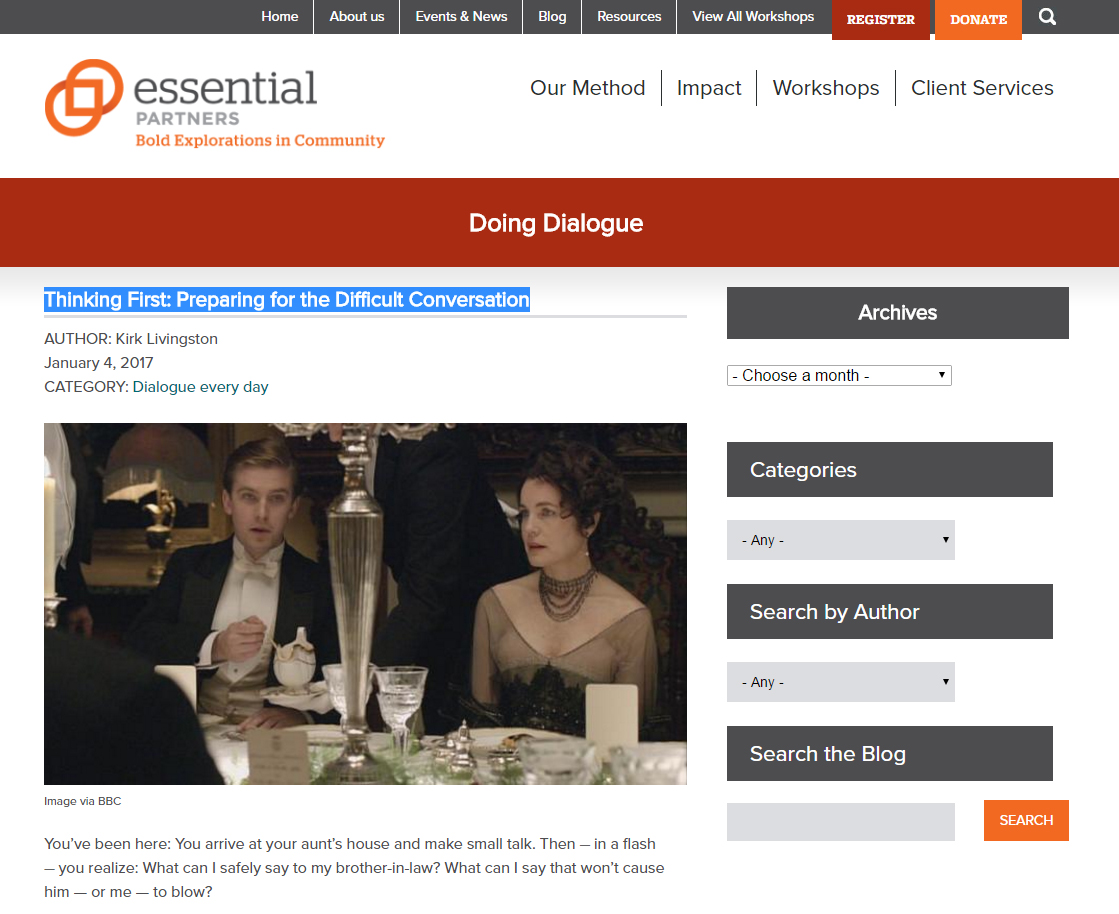Archive for the ‘Collaborate’ Category
“How Can I Help You?”
Hungry for Power Vs. Repairing the World
This question is an invitation—a beautiful invitation.
If you ask me how you can help, I have an immediate gut response: “Yes! Wait. What do I need right now?” Your question makes me an active participant in my life. The question reminds me I have choices to make about my needs. Do I need someone to hold a door or a wrench or a flashlight? Do I need a kick in the butt or a power nap?
What I need right now depends on what I am trying to do at this moment. But longer term, what does an employee need from a boss to do her job? What does a student need from an instructor to apply these writing lessons to his life? You can see the question initiates a call and response—like most everything with communication. A question that needs an answer. A draft followed by a revision.

From Christian theology, I might call the question an artifact of kenosis, that notion of self-giving that is so hard for us power-hungry humans to live out. Then again, maybe it is less an artifact and more an aspiration. Maybe the question is a statement about the person I hope to become: caring and thoughtful and using my time and attention to help you reach your goal. But still aspirational, because I have a feeling you may actually tell me what you need. And then I have to put down my book or turn off the TV or be late to work to help you.
No matter how you look at it, the question asks you to know something about yourself and about your journey through life. What do you need to move forward in your journey right now? Back to theology for a moment: The psalmists who wrote the Songs of Ascent (Psalms 120-134 in the Christian Bible) knew to query the creator and to articulate their need, whether for food or stability or growth or to beat up enemies. These authors (and generations of people who pray) had the sense that the Holy One was waiting in the wings with lovingkindness (“chesed”). They (the authors along with the many who pray) made a career of depending on that offer of help.
Maybe our use of the “How can I help you?” depends on the psalmist’s impulse. We thwart our own power-hungry instincts when we ask it of those who have no chance of moving us forward. But we ask it because of the kind of people we want to be and because we believe there is a deep well of chesed out there.
Maybe we ask “How can I help you?” because we are weary of constant rage and yearn for a vocation of repairing the world.

Morris dancers on break from repairing the world.
###
Image credits: Kirk Livingston
You hate to write. I get it.
3 Reasons Humans Should Look Forward to Writing
Writing feels like an interruption.
You’ve got all this work to do and writing a report or summarizing your diagnosis or conclusion takes you away from what you get paid to do. Writing is yet another duty added to a full stack of duties.
But are there things about writing you may have missed? Bear with me while I argue that writing should be an essential part of most jobs that require humans to work at their peak humanness.

Writing Reason #1: I Get to Reflect
Reflection—that process of slowing to examine something you or someone else has done or said—can have a healing effect. Slowing triggers a meaning-making mindset. You come to better understand things when you step aside to reflect: how your life works. How other people’s words work on your consciousness. Reflection helps you put things in order: just how much authority do I give the troll on Twitter? (Hint: very little). How can I grow as a husband/wife, friend, mother/father/sibling, colleague? These are the kind of human-scale questions that bubble up from reflection.
Reflection via writing is a dialogue with yourself about what is important. It must be so: because you must choose your first word to type. And then you must choose the next word, and then each word that follows. This can be painful, but it becomes less painful with practice. It becomes less painful as we understand that our small dialectical choices are an exploration of who we are. It is an exploration that is wrong, and wrong again, and wrong yet again until it is suddenly right and we ourselves with a fitting set of words.
Reflecting when we write makes us more human.
Writing Reason #2: I Did Not Know I Knew That
You’ve been in that odd conversation where a complete stranger asked a question and you convulsed an answer that you did now know you knew. Maybe something about the situation made you reveal a deeply held secret (“I’ve always hated applesauce!”) or a hidden desire (“I’ve always wanted to be a street mime.”). But something moved from a hidden place in your brain to your lips and out into the air. And there it sits between you and this other person. The silence around your declaration makes you think, “Wait—that is exactly right. That’s true!”
Writing does this all the time. By starting a conversation with yourself on paper or screen, your work of filling the paper/screen with neat lines of words has the effect of revealing what you know. It also has the effect of revealing what you don’t know.
I like to ask writing students to start writing when they don’t know nothing. Writing from the vacuum of nothing-knowing triggers curiosity, which is a primary tool for humans to solve problems and connect with other humans. After we choose words that tell what little we know, pertinent questions start to line the road to knowing. And then, if all goes well, our will gets engaged and we start to care. Along the way we discover things we didn’t know we knew. In a month when we read again the paragraph we wrote, we might say, “Huh. Yes. That seems right. I should act on that.”
Dialogue with other humans, even when simulated on paper via writing, is a deeply human activity and a route to knowing.
Writing Reason #3: I’ll Just Step Aside. And That Feels Good.
Today we start a class in communication. The class is full of very smart software graduate students. One thing we’ll learn is how to get out of the way of our message.
A lot of our past writing has been about proving to some instructor we know this about that. Our grade depended on this act of persuasion, so we conjured knowledge from bits we heard in class and from readings, and then we made things up. Some of our past business writing has been to convince a boss or executive committee that a certain course of action was necessary. There too we pulled from what we heard, from what we read, and then made things up. Both bouts of past writing had something to do with getting someone to feel a positive vibe toward us. We used our writing to show how smart we were so we could get the grade or promotion or plumb assignment.
But some writing out in the wild benefits from the author getting out of the way. In this class we’re aiming toward writing that is so fast, so easy to digest, that the reader knows new things before they realize they were reading. This is partly because we’re moving toward a post-literate society and reading a block of text is too big a commitment for many of us. We’re also writing this way as an antidote to those classes that taught us to always communicate with a personal, clever, word-garnish. Probably the teachers of those classes didn’t intend that lesson, but that’s what I heard and it stoppered my writing for years.
Getting out of the way to allow a bigger message to accomplish a larger purpose is a mark of human growth. Taking ego out of our writing is an act of love (which sounds strange) and an act of caring. It’s a kind of caring that can show up in our work-world, where there are not so many examples of caring.
Caring is a human thing to do.
Making time to write may just have a humanizing effect on us.
I hope it does.
###
Image: Kirk Livingston
3 Ways to Escape Your Tribe
I love ya. I gotta go.
You’ve started to entertain the notion that keeping identity with your tribe makes less sense than ever before. And you wonder at your own sanity because the facts before you do not match the story your tribe keeps telling:
- Maybe your tribe believes one person in your office has nothing good to say, but you think otherwise.
- Maybe your tribe is willing to look the other way as the elected official—whom the tribe helped elect—continues to lie, goes against the sacred center of your tribe’s beliefs and behaves increasingly erratically.
- Maybe your tribe shuts down alternate readings of your sacred text because those readings don’t suit the current ideological goals of the people calling the shots.

For these and any number of other reasons, it may be time to leave your tribe. But how? It’s tricky, because most of your friends and your family friends and friends of your friends are in the tribe. Maybe you spend all your time with these people. Maybe you live with these people. But here are three starting points:
- Check in with soul-friends. You know people who are like-minded and are driven less by ideology and more by relationship and caring. Find these folks and build trust with them. Spend time with them and share your concerns. Ask questions together and see if a new story emerges.
- Read and talk widely. Get different opinions from diverse people. Look for ways to read books that challenge the orthodoxy. The good news about challenge is that what is true remains while what is false slips away. But reading is best when you share points of interest with others—especially with those soul-friends. Look for opportunities to step outside your tribe: the person at work or in class who is clearly coming from a different perspective. Who knows where friendship and insight might come from? Actively seek others with questions, remember that you are not alone with your questions.
- Have Faith and Take Courage. Hold your core your beliefs firmly and ask questions of the periphery. This is the time-honored way of artists, writers, thinkers, activists and leaders. See where the questions lead—this is the way of sanity and art. Turning a blind eye to inconsistencies and discontinuities leads to a very bad place, a place where reality differs from tribal knowledge.
There is a way forward and you will find it.
Good luck and God-speed.
###
Image: Kirk Livingston
Thinking First: Preparing for the Difficult Conversation
Check out my guest post on the Essential Partners blog:
http://www.whatisessential.org/blog/thinking-first-preparing-difficult-conversation
3 Ways to Strengthen Your Next Think-Piece
Leadership is an emotional action story
Most of my clients see themselves as thought-leaders. These clients really are leaders in their industries: their scientists and engineers labor to create new ways of approaching old markets even as they open new markets. A think-piece is an outward-facing story of their leadership in the light of a market problem or need.
Some clients assume their brochures and web copy can be repurposed into a think-piece. One of my tasks is to help them understand that a think-piece takes a position on a problem, spins out a story that shows the problem resolved in an emotionally satisfying way. That is typically a larger frame of reference than their current brochure or web copy.
Other clients want to say something without revealing anything. They worry about competition in their tight market. But they don’t realize how a generous spirit is another kind of selling (especially in this sharing economy), and giving something-not-everything away is a mark of true leadership. But it’s just too big a task (they say) and it will “only distract our scientists and engineers.”
Sharp clients understand that thought-leadership presents a story that is immediately recognizable, universally understood (by their target audience) and easy to digest. They also understand that the best stories carry a useful thought with an emotional element.
My favorite thought-pieces typically have these three elements:
- Story: A story is threaded together with real people doing real things. There is emotion in a story—just like life—and real people talk in human rather than PR speak. Real people with real problems that unlock real emotion both before and after the solution appears.
- Visual: There’s no question that words simply take too long for most of us. We still read, of course, but our short attention spans move us toward images and video. Some say visual is the primary way social media will present in coming years. We can put that visual bias to work today with words that paint pictures. That has always been the novelist’s forte: creating scenes. That ability must find a home in today’s think-pieces. Gone are the days when an interested audience member might happily read your brochure. Now you have to catch them when they are not looking or thinking about your product or industry. This is not an easy task, but the more visual the better. Visual also has the advantage of being immediately understood.
- Speak Human: Every discipline has its own secret words. Every industry uses lingo and code words to show they know their stuff as well as out of sheer laziness. It’s just easier to say the same things as everyone else. Plus it’s a badge of the tribe, so why wouldn’t you? But insider language is inherently toxic for anyone outside. It’s a buzz kill for an outsider looking in. Speaking human means words cleansed of jargon, words that can shine through a clear story.
The best think-pieces don’t appear to be think-pieces at all. They can be read so effortlessly that we take every step with the author to the intended conclusion. And we find ourselves happy to be there, taking action with the hero.
###
Image credit: Kirk Livingston
You and Joe and Industry 4.0
Can we grow the ways we talk together?
Some say Industry 4.0 will be about Cyber-Physical systems, the Internet of Things and the Internet of Services. But I cannot help but wonder if, along the way, some genius with a high EQ will also find ways to bring out the best in people and unearth fresh ways for us to work together.

As hierarchy gives way to connecting mission with ideas and tasks, as people learn to bring their whole selves to work (emotion + logic + ethics + spirit—because they are rewarded for it), as people exercise agency and autonomy and ownership at work—things will look different.

Buber: Come on, folks: It’s “I/Thou” not “You are my tool.”
Maybe these geniuses, with the ginormous EQs, will help us understand what happens as we form ever more confining boxes around employees. Maybe they’ll show us that using metrics that note every eyebrow twitch and hand movement, metrics that reward those movements that fit the company goals, those metrics actually measure the wrong things and defeat innovation before it is even begun. Maybe these geniuses will notice that our levers of control over employees also inhibit the very thing we most need to move forward.
I imagine stepping into the office of one of these high EQ geniuses and glancing at the portrait of Martin Buber on the wall—their patron saint of collaboration. I imagine being lectured by these geniuses on strategies around deep listening and meetings that matter and how to disagree with each other productively and how they aggressively eradicate authority-rhetoric & boss speak because it is so demotivating to be reminded that someone owns you. And it is also, by the way, not true.
Let industry 4.0 grow to include people.
Please.
###
Dumb sketches: Kirk Livingston
What we mean when we say “PC”
Conversations will sometimes offend
“We’re all so PC today.”
When I hear this I wonder what the speaker means:
- Does she mean we work so hard to not offend each other that what we say is meaningless?
- Or does he mean he wants to get back to days of privilege (white, male, boss, pastor/priest, authority—name your privilege), back to when a part of our daily lexicon meant disparaging others deemed “less” because they did not line up with us?

If political correctness impinges on our ability to speak freely, that is not good. We must find ways to speak our thoughts—even if it means threading our words through verbal and perceived obstructions and pitfalls. Even if it means offending. But that’s the same with any relationship. Our conversations aim toward pulling others in more than pushing others away (Otherwise why talk at all? Just walk away.), so we take care speak to where our conversation partner is coming from. The end game of speaking our thoughts to each other is greater freedom, better articulation, and deepening friendships. Comedy sometimes makes that leap quickly by abruptly articulating a hidden thought. Those hidden thoughts, when exposed to air, can carry great meaning.
If there is one positive to come from the mouth of the patent-medicine salesman Trump, it is recognition that privilege exists in our nation and now we simply have to talk about it as a nation.
But if political correctness makes us long for a return to days of privilege where we verbally bully anyone perceived as different, then we must work against that. Others are to be understood, not hated. If political correctness helps us begin to see the inherent blindness of our particular place of privilege—let’s embrace that and learn.
We are at our best when connecting with each other.
We are at our worst when building walls.
###
Image credit: Kirk Livingston
 Don’t be your own jailer.
Don’t be your own jailer. 


